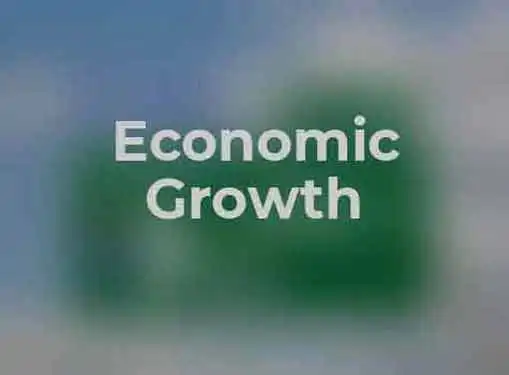Business Economics
Economic Growth
Written by Clayton Reeves for Gaebler Ventures
We discuss economic growth and the factors that make economic growth possible.
Economic growth occurs when the overall output of goods or services per capita increases over time.

Economies grow for a variety of reasons. First, let's go over the preconditions for sustained economic growth.
Specialization
GDP is the gross domestic product of an entire entity. This can be a country or simply a state. The state of California, for example, has one of the highest GDPs in the entire world, when compared with countries of similar size. One of the key drivers in the growth of this product is specialization.
Specialization occurs when a worker is better at performing one task than another. Using the butter and gun example, consider Countries A and B. Country A produces guns and Country B produces butter.
Country A has a huge deposit of iron in their country and their technologies enable them to make reliable and well performing guns. However, they do not have a good base of livestock and cannot acquire the dairy products necessary to create butter.
Country B, on the other hand, is covered in rolling fields and has an extensive cattle supply. They make butter with great efficiency, but lose some of their livestock to predators and don't have the ability to make guns to protect their herds with.
This is where specialization comes into play. If one is significantly more efficient at producing one product, it makes sense for that country to produce that product and then trade with other countries to receive whatever other products they need. If Countries A and B had closed borders, they would not need to specialize in their products. However, the next precondition for economic growth is the presence of trade.
Trade
Trade is necessary for specialization to take place. If trade is restricted, countries will be forced to make products that aren't necessarily their expertise. Trade opens up opportunities for workers to specialize on their profession and really increases productivity.
In our previous problem, Country A would trade guns to Country B, who would send butter to Country A in return. A and B can then produce more of what they do best, and both countries benefit. This is what increases standards of living worldwide. The changes that occur from opening up borders to trade usually drastically outweigh the changes from productivity alone.
However, it isn't as easy as simply setting up arrangements and then trading items in such a civil manner. There are tons of obstacles to trade that may elude the common observer. As a small business owner, you must understand and engage in these obstacles to truly run your business. Cultural, political and economical obstacles can all contribute to restrictions on trade. These things can affect your business.
When trade and specialization work together, there is no arguing that it increases the well being of the world. However, specialization also has negative short term consequences that can sometimes put more political pressures on restricting trade.
This is where terms like offshoring and outsourcing come into play. There are strong negative connotations with these terms, even though they are simply economic realities that have to come about to increase the standard of living around the world. I'll go into further detail in subsequent articles about the impacts of economic theories on practical business implementations.
When he's not playing racquetball or studying for a class, Clayton Reeves enjoys writing articles about entrepreneurship. He is currently an MBA student at the University of Missouri with a concentration in Economics and Finance.
Share this article
Additional Resources for Entrepreneurs



Conversation Board
What's your take on economic growth?